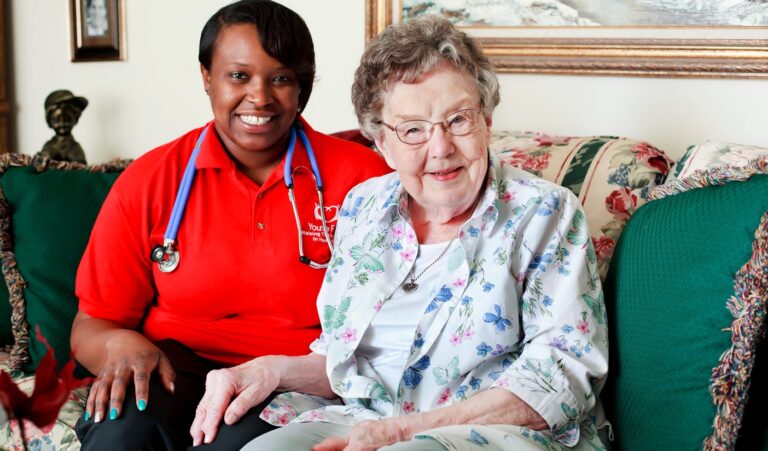Part Two
He’s Not Acting, Out Hes Communicating
“Hey! She’s stealing my clothes!” Mr. Smith becomes agitated and starts yelling out. The more his daughter tries to calm him, the worse he becomes. The housekeeper was collecting items to be washed and very pleasantly acknowledged Mr. Smith as she went about her work, but never asked him if it was ok to collect his clothing to wash, letting him know she would return them as soon as the laundry was done. In his mind, she was stealing from him.
“Mom has been roaming around the house for the last three hours. I can’t get her back to her room. I think we need to call the doctor and see if there is something he can prescribe to relax and calm her down”, said her son to his wife. Ms. Jones was hungry but didn’t know how to communicate this to her son. She didn’t like what had been fixed for dinner, so she didn’t eat much. She was looking for something to eat.
Individuals with Dementia are often misunderstood as the people around them don’t know how to communicate with them or how to identify what the individual’s actions really mean. Keep in mind, there is usually a reason behind all actions or outbursts for an individual with Dementia. We just have to figure out what it is.
Wandering and/or Getting Lost
Wandering and/or getting lost is very common for individuals with Dementia; more than 60% will wander at some point.
What to do: eliminate hunger/thirst, having to use the restroom, etc., first. If none of these satisfy them, they may be trying to go home, even if they are already home or following a routine they used to have. Take them for a walk, go for a ride in the car, or try to involve them in an activity to ease anxiety and restlessness. Folding laundry, preparing food, making dishes, music, art, or garden therapies.
Note: make sure you have deadbolts or locks on exterior doors to keep the person safe from leaving the premises undetected (never lock a person with Dementia in a home without supervision) and limit access to potential hazards.
Anxiety or Agitation
It becomes difficult for individuals with Dementia to process information and handle stimuli as the disease progresses. Think about how frightening it would be for you to be in a situation or place that is unfamiliar without the ability to process what’s going on around you. Throw in Sundowning, and it’s no wonder a person with Dementia can become anxious or agitated.
What to do: find out what is causing the anxiety or agitation, and really listen to them without judgment. Provide reassurance, use calming phrases, and let them know you are there for them; you will do everything possible to make the situation better. They may need an outlet for pent-up energy; try going for a walk or car ride.
Modify their environment; limit distractions or noise. Try activities like music, art, or aroma therapies.
Note: Sundowning – late-day confusion. It is believed by many that the sun going down casts shadows which make it difficult for an individual with Dementia to figure out what they are seeing, thus causing more confusion, anxiety, and agitation.
What to do for Sundowning:
- Stick to a schedule as best as possible throughout the day. Minimize their stress.
- Light up their world – light up their environment by turning on the lights before the sun begins to set; use fluorescent lighting-keep it bright.
- Keep them active, which may help keep them distracted; also, the more active they are during the day, the better they should sleep at night (avoiding days and nights getting mixed up).
- Adjust eating patterns; smaller meals in the evening may help them feel and sleep better.
- Provide comfort and familiarity; the world can be scary to an individual with Dementia.
Aggression
Verbal – shouting, name-calling, cursing or physical – hitting, pushing…these behaviors sometimes occur out of the blue, with no apparent reason, or because of a frustrating situation. We need to try to understand what is causing this; there is a reason.
What to do: find out what happened right before the behavior started. Rule out pain; pain in Dementia often times causes a person to act aggressively. Focus on the person’s feelings behind the words or actions. Don’t get upset; this will just make the situation worse. They can all tell when someone is upset. Speak slowly in a soft tone and be positive/reassuring. Use redirection skills.
Limit distractions; look at their surroundings. Try a relaxing activity; music, massage, painting, or gardening.
Confusion
Aside from forgetfulness, confusion is one of the most common characteristics of Dementia. Confusion requires patience and understanding from care providers and family. Think about living in a world where people, places, and things are foreign to you; even asking a question or giving a directive can be confusing.
What to do: stay calm. If they call a spoon, a fork, or a book a desk, it’s ok. Try using photographs and other thought-provoking items to remind them of the relationship, thing, or place. Keep explanations simple. Avoid anything that sounds like scolding or frustration on your part; “I told you this yesterday,” or “We talked about this before.” Don’t take it personally.
I had a client that told me she was exhausted one morning because someone drugs her mattress out into the forest the night before. (There was a group of trees visible from her living room window.) She had to bring it back in. Of course, I know this didn’t happen, but what was the point of disagreeing with her? I told her that I would ask around to see if I could find out who played the prank. If I found out, we would go drag their mattress out into the forest that night and return the prank. Of course, she forgot about it, but the reply I gave satisfied her.
Repetition
Repeating a word, question, or activity is common in Dementia. They may pace or undo what has just been done. Respond to rather than react to the behavior. Turn the behavior into an activity. “Come help me dry the dishes, dust, etc. Even if they have told you something 100 times, ask them something about what they just told you. If it isn’t harmful, just go with it.
One of our clients has told her aide every day for the past 18 months how she crocheted the tablecloth on her dining table. Our aide always tells her how beautiful it is and asks if she would like to crochet again. She has taken her to a few crochet group meetings. She loves it. She has not crocheted, but it validates her feelings. The bottom line, people with Dementia usually don’t just act out for no reason at all. We must try our best to figure out what they need, want, and are confused or scared by. They have no control over how they feel, see, or think about what is going on in their environment. It is frustrating and scary for them not to have their needs met or feel secure in their surroundings. It is our job to make sure they have the BEST life possible, full of love, laughter, and security!!






